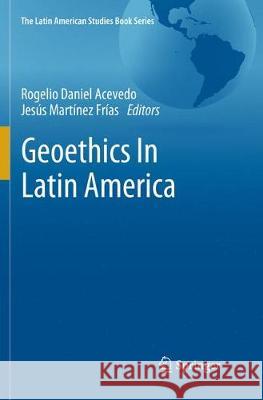Geoethics in Latin America » książka



Geoethics in Latin America
ISBN-13: 9783030092160 / Angielski / Miękka / 2018 / 205 str.
Geoethics in Latin America
ISBN-13: 9783030092160 / Angielski / Miękka / 2018 / 205 str.
(netto: 383,36 VAT: 5%)
Najniższa cena z 30 dni: 385,52
ok. 16-18 dni roboczych.
Darmowa dostawa!
"This book moves us towards the goal that geoethics will reach an even larger audience of South American geologists as well as other geoscientists interested in working in this part of the world. ... Geoethics in Latin America is a well-structured collection and a very useful research book which can serve as a reference for researchers-academics, educators, and students interested in geoethics." (Mohamed Abioui, Lhassan M'Barki, Mohammed Benssaou, Andrea Di Cencio and Mohamed Dades, Science and Engineering Ethics, Vol.25, 2019)
Part 1.- 1.1 Geoethics.- 1.1.2 Introduction.- 1.1.3 Overall objectives.- 1.1.4 Relate goals to overall IUGS scientific objectives.- 1.2 Geoethics: basic concepts and its potential for UNESCO Geoparks.- 1.2.1 Introduction.- 1.2.2 What is geoethics and why is it necessary?.- 1.2.3 Geosphere and Earth System: understanding planetary dynamics.- 1.2.4 Anthropocene and Anthropogenic Global Change.- 1.2.5 Earth system goods and services.- 1.2.6 Geosphere values.- 1.2.7 Behave and act ethically: areas of application of geoethics.- 1.2.8 Geoethics and UNESCO Global Geoparks.- 1.2.9 Conclusions.- References.- 2 Argentina.- 2.1 Towards a Latin American Geoethics?.- 2.1.1 Introduction.- 2.1.2 Unthinking Geoethics.- 2.1.2.1 Professional field.- 2.1.2.2 Social and Human Sciences fields.- 2.1.2.3 Social field.- 2.1.3 Reasons for a Latin American Geoethics?.- 2.1.3.1 Latin American ideas.- 2.1.3.2 Structural historical features.- 2.1.4 Conclusions.- References.- 2.2 The Superior Geology Professional Council and ethics.- 2.2.1 Introduction.- 2.2.2 Some facts about ethics.- 2.2.3 Consequences.- 2.2.4 The Code of Ethics.- 2.2.5 Conclusions.- References.- 3 Brazil.- 3.1 Ferruginous Geosystems and the current situation of iron in Brazil: economic growth or environmental regression?.- 3.1.1 Introduction.- 3.1.2 Iron.- 3.1.3 Banded Iron Formations (BIFs) and Conservation Units in Brazil.- 3.1.4 Cangas.- 3.1.5 The FGGs and the iron mining in Brazil.- 3.1.6 Quadrilátero Ferrífero (QF).- 3.1.7 Serra dos Carajás (SCJ).- 3.1.8 The relation between mining, hydrogeology and FGSs in Brazil.- 3.1.9 Regulatory Inconsistencies.- 3.1.10 Risks of retreats to environmental conservation.- 3.1.11 Final Remarks.- References.- 3.2 Gigantic cities and the new challenge of an old science: Geoethics, geoeducation and geoknowledge in Porto Alegre, Brazil.- 3.2.1 Introduction.- 3.2.2 Terra Urbis: Growth and scales of the cities in the urbanizing world.- 3.2.2.1 The metropolis without limits: the era of the giant cities.- 3.2.2.2 Chains of giant cities: how big can be urban agglomeration?.- 3.2.2.3 The nature surrounded by the city: the ecumenopolis or the mundus-city.- 3.2.3 The city as geological global fact: The dawn of the techno-urbansphere.- 3.2.3.1 Understanding cities as a global geological fact and introducing Geoethics: new challenges to live in urban realm.- 3.2.3.2 The geohazardous edges of techno-urbansphere: when the city reaches the volcano slope and plate tectonics boundary.- 3.2.3.3 The complexity of techno-urbansphere needs geoethic culture and geoknowledge for all citizens.- 3.2.4 Geoknowledge and Geoethics for urban sustainability: The example of the environmental atlas of Porto Alegre city.- 3.2.4.1 Geology and urban environment: understanding the natural history of the city.- 3.2.4.2 Urban environmental management, citizen participation and geoeducation: Geoethics and paths to tame the techno-urbansphere.- 3.2.5 Final remarks: towards a geoethic culture for urban realm.- References.- 4 Chile.- 5 Colombia.- 5.1 Geology as a profession and Geoethics in Colombia.- 5.1.1 Introduction.- 5.1.2 National institutions related to earth sciences in Colombia.- 5.1.3 University programs in earth sciences in Colombia.- 5.1.4 Associations.- 5.1.5 The 09 law of 1974.- 5.1.6 The code of ethics for geologists.- 5.1.7 Further considerations.-References.- 5.2 The Geoethical promise and the incorporation of disaster risk management in the territorial ordination of Colombia.- 5.2.1 Introduction.- 5.2.2 The Geoethical Promise.- 5.2.3 The Dissertation.- References.- 6 Ecuador.- 6.1 Ethics, policy and risk assessment of the Cotopaxi volcanic crisis in Ecuador – Vulnerable society versus unprepared volcanic monitoring staff and authorities.- 6.1.1 Introduction.- 6.1.2 Geological history and volcanic hazards associated with Cotopaxi volcano.- 6.1.3 Volcanic Risk assessment in Ecuador.- 6.1.3.1 Authorities and line of command.- 6.1.3.2 Volcanic Monitoring in Ecuador.- 6.1.3.3 Education and Prevention.- 6.1.4 Previous handling of volcanic crisis in Ecuador.- 6.1.5 The recent volcanic activity of the Cotopaxi volcano.- 6.1.5.1. Volcanic activity in 2001-2015.- 6.1.5.2 14th of August 2015 – First explosions.- 6.1.5.3 15th of August 2015 – False alert, first victims and state of exception.- 6.1.6 Social and economic situation after false alert: knowledge management and communications skills.- 6.1.6.1 Knowledge management.- 6.1.6.2 Communication skills.- 6.1.7 Conclusions and recommendations.- References.- 7 Paraguay.- 7.1 An approach to Geoethics in Paraguay.- 7. 1.1 Paleontology.- 7.1.2 Paso-Yobai gold, a short summary.- 7.1.3 Diamonds.- 7.1.3.1 South America Diamonds.- 7.1.3.2 “Blood diamonds”?.- References.- 8 Perú.- 9 Venezuela.- 9.1 The epistemological evolution… The beginning of a “Geoethics” cosmovision.- 9.1.1 The evolution of the Ethics, Bioethics and Geoethics within the energy sector.- References.
This book studies geoethics in Latin America and offers comprehensive research on geoethics and geoeducation. Its respective chapters explore geoethics in relation to UNESCO geoparks, mining activities in Latin America, natural hazards and risk management.
Geoethics is a key discipline in the field of Earth and Planetary Sciences, and not only includes scientific, technological, methodological and social-cultural aspects, but also addresses the need to consider appropriate protocols, scientific integrity issues and a code of good practice when studying the abiotic world.
The position of Latin America’s recently created geoethics associations is based on protection of the environment, together with a reassurance that the balance of nature and the rights of human beings to enjoy it will be preserved.
1997-2026 DolnySlask.com Agencja Internetowa
KrainaKsiazek.PL - Księgarnia Internetowa









